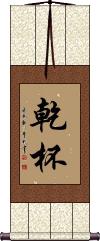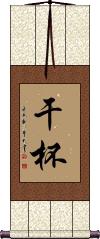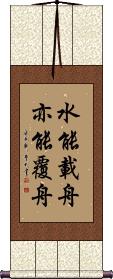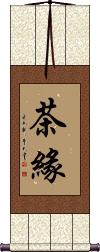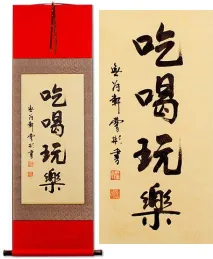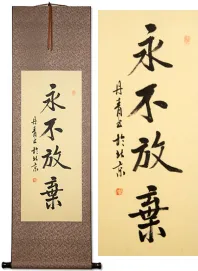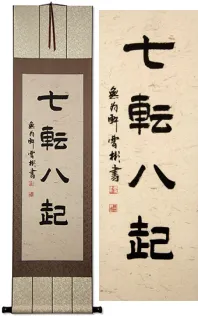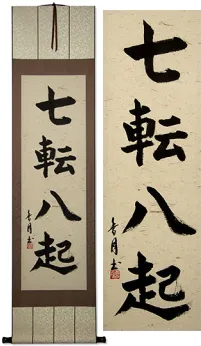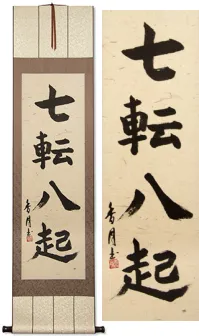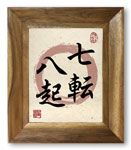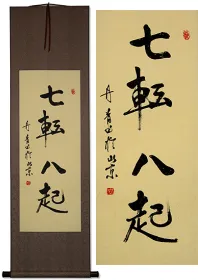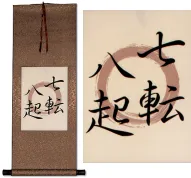Many custom options...
And formats...

The name Drink Up in Chinese / Japanese...
Buy a Drink Up calligraphy wall scroll here!
Personalize your custom “Drink Up” project by clicking the button next to your favorite “Drink Up” title below...
Drink Up! / Cheers!
乾杯 is the common way to say “cheers” or give a toast in Chinese, Japanese and old Korean (written the same in all three languages, though pronounced differently).
乾杯 is an appropriate wall scroll for a bar, pub, or another drinking area.
The first character literally means “dry” or “parched.”
The second character means “cup” or “glass.”
Together the meaning is to drink up (empty your glass).
Drink Up! / Cheers!
Alternate version
Not Only Can Water Float A Boat, It Can Sink It Also
Many things have opposite properties. The water you drink can also drown you. Pork may nourish you and keep you alive but under-cook it and it could kill you. Potassium nitrate is often used as a fertilizer to grow the food that sustains us but it's also been used as an explosive to topple buildings and destroy us.
This concept is easily associated with “yin yang” where an element has two opposite properties that are as different as night and day.
This proverb's meaning can be summed up this way: “Anything that can lead you to success may also contain great risks.”
This phrase is known in literary circles by Korean people (scholars or literature). It is therefore also a valid proverb in Korean Hanja, though most Koreans would not be able to make sense of it.
Please note that there is an unwritten rule when the same character appears twice in the same phrase, the calligrapher will alter the appearance so that no two characters are exactly alike in the same piece. This calligraphy has two repeating characters that will be written differently than they appear here.
Tea Fate
茶緣 is a special title for the tea lover. This kind of means “tea fate,” but it's more spiritual and hard to define. Perhaps the tea brought you in to drink it. Perhaps the tea will bring you and another tea-lover together. Perhaps you were already there, and the tea came to you. Perhaps it's the ah-ha moment you will have when drinking the tea.
I've been told not to explain this further, as it will either dilute or confuse the purposefully-ambiguous idea embedded in this enigma.
I happen to be the owner of a piece of calligraphy written by either the son or nephew of the last emperor of China, which is the title he wrote. It was given to me at a Beijing tea house in 2001. 茶緣 is where I learned to love tea after literally spending weeks tasting and studying everything I could about Chinese tea. I did not understand the significance of the authorship or the meaning of the title at all. Some 10 years later, I realized the gift was so profound and had such providence. Only now do I realize the value of a gift that it is too late to give proper thanks for. It was also years later that I ended up in this business and could have the artwork properly mounted as a wall scroll. It has been borrowed for many exhibitions and shows and always amazes native Chinese and Taiwanese who read the signature. This piece of calligraphy I once thought was just a bit of ink on a thin and wrinkled piece of paper, is now one of my most valued possessions. And fate has taught me to be more thankful for seemingly simple gifts.
This in-stock artwork might be what you are looking for, and ships right away...
Gallery Price: $61.00
Your Price: $33.88
Gallery Price: $61.00
Your Price: $33.88
Gallery Price: $61.00
Your Price: $33.88
Gallery Price: $61.00
Your Price: $33.88
Gallery Price: $61.00
Your Price: $33.88
Gallery Price: $176.00
Your Price: $97.77
Gallery Price: $100.00
Your Price: $49.88
Gallery Price: $180.00
Your Price: $99.88
Gallery Price: $222.00
Your Price: $122.88
Gallery Price: $222.00
Your Price: $122.88
Gallery Price: $100.00
Your Price: $49.88
Gallery Price: $100.00
Your Price: $39.88
Not the results for drink up that you were looking for?
Below are some entries from our dictionary that may match your drink up search...
| Characters If shown, 2nd row is Simp. Chinese |
Pronunciation Romanization |
Simple Dictionary Definition |
乾す see styles |
hosu ほす |
(transitive verb) (1) to air; to dry; to desiccate; (2) to drain (off); (3) to drink up; (4) to deprive of a role, job, etc. (usu. in the passive) |
吸盡 吸尽 see styles |
xī jìn xi1 jin4 hsi chin |
to absorb completely; to drink up |
喝光 see styles |
hē guāng he1 guang1 ho kuang |
to drink up; to finish (a drink) |
喝掉 see styles |
hē diào he1 diao4 ho tiao |
to drink up; to finish (a drink) |
干す see styles |
hosu ほす |
(transitive verb) (1) to air; to dry; to desiccate; (2) to drain (off); (3) to drink up; (4) to deprive of a role, job, etc. (usu. in the passive) |
水乳 see styles |
shuǐ rǔ shui3 ru3 shui ju suinyū |
Water and milk— an illustration of the intermingling of things; but their essential separateness is recognized in that the rāja-haṃsa (a kind of goose) is said to be able to drink up the milk leaving behind the water. |
飲乾す see styles |
nomihosu のみほす |
(irregular okurigana usage) (transitive verb) to drink up; to drain (cup) |
飲干す see styles |
nomihosu のみほす |
(irregular okurigana usage) (transitive verb) to drink up; to drain (cup) |
遣らかす see styles |
yarakasu やらかす |
(transitive verb) (1) (colloquialism) (kana only) (See しでかす) to do (something negative); to make (a blunder); to commit (an error); (transitive verb) (2) (colloquialism) (kana only) to drink up; to eat up |
飲みほす see styles |
nomihosu のみほす |
(transitive verb) to drink up; to drain (cup) |
飲み乾す see styles |
nomihosu のみほす |
(transitive verb) to drink up; to drain (cup) |
飲み干す see styles |
nomihosu のみほす |
(transitive verb) to drink up; to drain (cup) |
Variations: |
hosu ほす |
(transitive verb) (1) to air; to dry; to desiccate; (transitive verb) (2) to drain (off); (transitive verb) (3) to drink up; (transitive verb) (4) (usu. in the passive) to deprive of a role, job, etc. |
Variations: |
nomihosu のみほす |
(transitive verb) to drink up; to drink to the last drop; to drink (a glass) dry; to drain (one's glass); to empty; to down (a drink) |
Variations: |
nomihosu のみほす |
(transitive verb) to drink up; to drain (cup) |
The following table may be helpful for those studying Chinese or Japanese...
| Title | Characters | Romaji (Romanized Japanese) | Various forms of Romanized Chinese | |
| Drink Up! Cheers! | 乾杯 | kan pai / kanpai | gān bēi / gan1 bei1 / gan bei / ganbei | kan pei / kanpei |
| Drink Up! Cheers! | 干杯 | gān bēi / gan1 bei1 / gan bei / ganbei | kan pei / kanpei | |
| Not Only Can Water Float A Boat, It Can Sink It Also | 水能載舟亦能覆舟 水能载舟亦能覆舟 | shuǐ néng zài zhōu yì néng fù zhōu shui3 neng2 zai4 zhou1 yi4 neng2 fu4 zhou1 shui neng zai zhou yi neng fu zhou | shui neng tsai chou i neng fu chou | |
| Tea Fate | 茶緣 茶缘 | chá yuán / cha2 yuan2 / cha yuan / chayuan | ch`a yüan / chayüan / cha yüan | |
| In some entries above you will see that characters have different versions above and below a line. In these cases, the characters above the line are Traditional Chinese, while the ones below are Simplified Chinese. | ||||
Successful Chinese Character and Japanese Kanji calligraphy searches within the last few hours...
